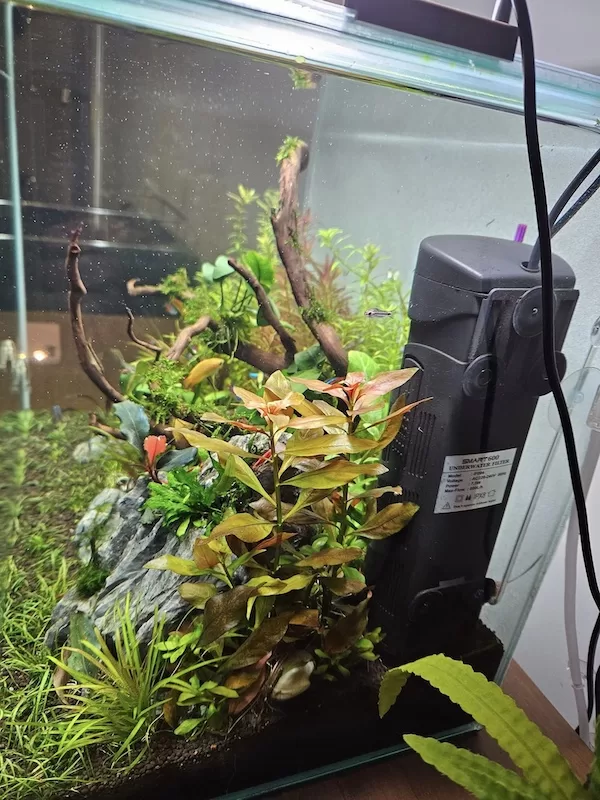Aquarium, Blog, Troubleshooting
Why Has My Aquarium Filter Slowed? Causes, Fixes, and Tips
Why Has My Aquarium Filter Slowed Down? Fixes, Tips, and How to Prevent It
Table of Contents
- Why is my aquarium filter slowing down?
- What causes an aquarium filter to slow down?
- How do I fix a slow aquarium filter?
- How can I keep my aquarium filter running smoothly?
- What products can help maintain my aquarium filter?
- Frequently Asked Questions
- Wrapping Things Up
Why is my aquarium filter slowing down?
Let me guess—your once-powerful aquarium filter has turned into a lazy dribble, and your tank is starting to resemble a swamp more than the clean, clear paradise it once was. Been there! It’s one of those moments every aquarist faces sooner or later, especially if you’re newer to the hobby.
Before you panic and start shopping for a new filter, let me share some hard-earned advice (and maybe a story or two) from my years of keeping fish, shrimp, and all sorts of aquatic critters. There are a few common reasons why filters slow down, but fortunately, most of them are super fixable—no need to throw money at a new setup just yet.
I’ve been breeding shrimp and fish for years, and trust me, I’ve seen every filter problem under the sun. From clogged-up media to motors giving up the ghost, I’ve had my hands deep in the guts of many filters trying to figure out what went wrong. So, if you’re sitting there wondering, “Why has my filter slowed down?” I can bet you it’s one of these reasons below.
What causes an aquarium filter to slow down?
Let’s get to the heart of it. Filters don’t just slow down for no reason, right? There’s always something going on behind the scenes. Here are the big players when it comes to sluggish filter flow:
1. Clogged Filter Media
Oh boy, this one’s a classic. Filters are meant to trap all that junk floating around in your tank—bits of leftover food, fish waste, plant debris, and who knows what else. Over time, the filter media gets jam-packed, and water struggles to flow through it. It’s like trying to drink through a straw that’s clogged with old smoothie—you get the idea.
Back when I started keeping Neocaridina shrimp, I learned this lesson the hard way. I kept noticing that the flow rate would drop every couple of weeks, and every time, I’d pull out what looked like a blanket of shrimp molts and gunk. Now, I’ve got a routine for cleaning, and I don’t wait until it’s totally choked up.
2. Dirty or Jammed Impeller
You probably never even thought about your filter’s impeller, did you? That little spinning piece is the powerhouse behind your filter’s flow. But when it gets jammed up with debris, the whole thing grinds to a near halt. I once had a chunk of plant leaf wedged in there, and it took me days to figure out why the water was barely trickling. I felt like an idiot when I finally cleaned it out and the filter sprang back to life.
Pro Tip: Get yourself an old toothbrush for this job. It works like magic for scrubbing that impeller clean. Keep it in your aquarium toolkit, and no, don’t use it on your teeth later.
3. Blocked or Kinked Tubing
If you’re running a canister filter, you know that those long hoses can be trouble. Sometimes they get kinked, and sometimes they just collect a bunch of crud over time. I had a canister filter once that started slowing down for what felt like no reason at all. After poking around, I discovered the tubing was lined with what I can only describe as algae sludge. Once I flushed it out, boom—good as new.
4. Low Water Level
This one’s a sneaky one. If you’ve got a hang-on-back filter (HOB for short), it’s easy to overlook the water level in your tank. These filters need a certain amount of water to keep the flow going strong. If the water dips too low, your filter might be sucking in more air than water, and that’s not good for anybody.
5. Aging or Worn-Out Motor
Now, I’ll admit, this is less common, but I’ve had a couple of filters over the years where the motor just started to wear down. If you’ve had the same filter running for years, sometimes the motor gives out. It’s kind of like an old car—at some point, you have to decide whether it’s worth fixing or if it’s time for a new one.
How do I fix a slow aquarium filter?
So now you know what the problem is, what do you do about it? Well, lucky for you, most of these issues are super easy to fix. Here’s how I go about getting my filters back in shape:
1. Clean the Filter Media
This is usually the first thing I do. I pull out the media, give it a good rinse in tank water (never tap water—chlorine is the enemy of good bacteria), and if it’s beyond saving, I swap it out for new media. Simple, right? The trick is to clean it regularly so you don’t get to the point where it’s completely clogged.
Real Tip: Keep a bucket of tank water nearby for cleaning your filter media. That way, you can save all that good bacteria you worked so hard to cultivate.
2. Clean the Impeller
This little guy is easy to overlook, but it’s one of the most important parts of the filter. Unplug the filter, take out the impeller, and give it a good scrub. Nine times out of ten, this will get your filter running like it just came out of the box.
Pro Tip: Be gentle when cleaning the impeller. It’s small but mighty—too much force and you could damage it.
3. Flush the Tubing
If you’re using a canister filter, check the tubing for any blockages. You might need a special cleaning brush for this, or you can just flush the tubes out with water. Either way, a little maintenance here goes a long way.
4. Top Off Your Tank
For those with HOB filters, this is probably the easiest fix you’ll ever do. Just add more water! Keeping the tank topped off ensures the filter is pulling in water, not air. Trust me, it makes a world of difference.
5. Test the Motor
If you’ve tried everything else and the filter is still sluggish, the motor could be on its last legs. Check your filter’s manual for troubleshooting tips. Sometimes a good cleaning is all it needs, but if the motor is worn out, it might be time to look for a new filter.
How can I keep my aquarium filter running smoothly?
Alright, now that you’ve got your filter back in business, let’s keep it that way. The secret? A little regular maintenance goes a long way. Here are my top tips for keeping your filter running like a champ:
- Set a Regular Cleaning Schedule: I clean my filters every couple of weeks. It’s not a big job if you do it regularly. If you wait too long, though, it turns into a bigger mess than it needs to be.
- Watch Your Water Level: Especially for HOB filters. A low water level means poor flow, and that leads to all kinds of problems down the road.
- Feed Your Fish Less: Overfeeding equals more waste, which equals more work for your filter. Keep the feeding light, and your filter won’t have to work so hard.
- Use a Pre-Filter Sponge: These little guys are great for catching large debris before it hits your filter media. They’re easy to clean, too. Check out a small double sponge filter to keep your water cleaner.
What products can help maintain my aquarium filter?
These are my go-to products when it comes to keeping my filters in top shape:
- Prime Water Conditioner: This is a solid water conditioner that helps protect your fish during filter maintenance or water changes. It’s like a little extra insurance for your tank.
- No Planaria: If your filter is getting clogged by planaria or organic matter, No Planaria does the trick. Safe for shrimp too!
- Flexible Aquarium Tube Brush: For those canister filters, this brush makes cleaning out the tubing a breeze. No more gunk slowing things down.
Frequently Asked Questions
How often should I clean my filter?
I clean mine every 2-4 weeks, depending on the size of the tank and how many fish or shrimp I have in there. More fish means more waste, which means more frequent cleaning.
Can I use tap water to clean my filter media?
You could, but I wouldn’t recommend it. Tap water has chlorine, which kills off the good bacteria in your filter. Always use tank water or dechlorinated water.
What if my filter is making weird noises?
That usually means something is stuck in the impeller or the motor is struggling. Give it a good cleaning, and if the noise persists, the motor might be wearing out.
Wrapping Things Up
If your filter has slowed down, don’t sweat it—it happens to all of us. A little troubleshooting and maintenance will usually get things back to normal. Filters are like the lungs of your aquarium, and keeping them clean means happier, healthier fish (and shrimp, if you’re like me).
And hey, if you’ve got any filter stories of your own—maybe you found something weird clogging it or had an “aha!” moment after hours of head-scratching—drop me a comment below. I’d love to hear it. You’re not alone in the wild world of aquarium keeping!


